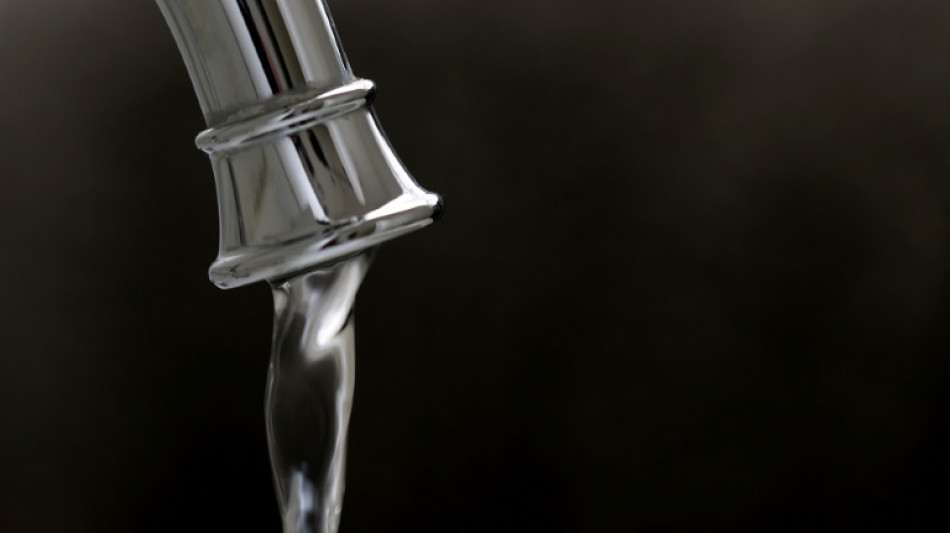
-
 Vinicius Junior in the clear over Clasico outburst
Vinicius Junior in the clear over Clasico outburst
-
UK welcomes king's move to strip Andrew of royal titles

-
 Liverpool must snap losing 'habit', says under-fire Slot
Liverpool must snap losing 'habit', says under-fire Slot
-
Bencic out of Hong Kong last eight as tennis injury list mounts

-
 Xi invites Canada PM to China in first meet in 8 years
Xi invites Canada PM to China in first meet in 8 years
-
Chinese defence minister seeks 'trust' with US but cautions over Taiwan

-
 India's Rodrigues beat anxiety and tears to become World Cup star
India's Rodrigues beat anxiety and tears to become World Cup star
-
China, Canada leaders hold first formal talks since 2017

-
 Nvidia to supply 260,000 cutting-edge chips to South Korea
Nvidia to supply 260,000 cutting-edge chips to South Korea
-
Camels replace cows as Kenya battles drought

-
 Endangered across west Africa, leopards thrive in I.Coast reserve
Endangered across west Africa, leopards thrive in I.Coast reserve
-
Risky gold rush drives young into Ivory Coast nature park

-
 Deadly roads block mothers from care in jihadist-hit Nigeria
Deadly roads block mothers from care in jihadist-hit Nigeria
-
Pillaged I.Coast nature reserve on the mend after crisis decade

-
 India savours 'greatest day' after Women's World Cup heroics
India savours 'greatest day' after Women's World Cup heroics
-
Why emboldened Kim had little need for photo-op with Trump

-
 In the black: the business of mourning Thailand's queen mother
In the black: the business of mourning Thailand's queen mother
-
Tributes as death of Australian teenager touches cricket world

-
 Jackson throws four TD passes as Ravens rout Dolphins
Jackson throws four TD passes as Ravens rout Dolphins
-
NBA champs Thunder roll past Wizards, Bucks and Spurs win

-
 UK's Andrew in freefall, stripped of queen's protection
UK's Andrew in freefall, stripped of queen's protection
-
Real Madrid and Barcelona aim to shake off Clasico consequences

-
 Ambitious Paris FC making steady progress after landing in big time
Ambitious Paris FC making steady progress after landing in big time
-
Rebuilt Leverkusen hope to reignite Bundesliga rivalry at Bayern

-
 Xi primed to meet Japan, Canada leaders after Trump summit
Xi primed to meet Japan, Canada leaders after Trump summit
-
Australia coach Schmidt pleads for Edmed patience ahead of England clash

-
 Liverpool feel pressure to end 'crisis' run, Man City test Bournemouth limits
Liverpool feel pressure to end 'crisis' run, Man City test Bournemouth limits
-
Farrell eyes 'reset' as Ireland-All Blacks ready for 'Battle of Chicago'

-
 Asia markets mostly up on heels of Apple, Amazon earnings
Asia markets mostly up on heels of Apple, Amazon earnings
-
Jones wants Japan to enhance 2015 legacy against South Africa

-
 Growing rice in the UK 'not so crazy' as climate warms
Growing rice in the UK 'not so crazy' as climate warms
-
Australia say 'let ourselves down' after India end world domination

-
 AI cannot make cinema, director Linklater says
AI cannot make cinema, director Linklater says
-
After delays, Egypt set for lavish opening of grand museum

-
 What we know about the downfall of Andrew, born a UK prince
What we know about the downfall of Andrew, born a UK prince
-
Desperate Dodgers mull using Ohtani as relief pitcher

-
 Blue Jays vie to close out sputtering Dodgers in World Series
Blue Jays vie to close out sputtering Dodgers in World Series
-
Indigenous Australians celebrate historic state treaty

-
 Caught between Venezuela and US, Trinidad fishermen fear the sea
Caught between Venezuela and US, Trinidad fishermen fear the sea
-
Latest NFL Chiefs-Bills duel has both chasing division leaders

-
 Sierra Leone chases rare repeat in Breeders' Cup Classic
Sierra Leone chases rare repeat in Breeders' Cup Classic
-
King Charles strips Andrew of royal titles, Windsor home

-
 Sales of 'services' help Apple beat earnings forecasts
Sales of 'services' help Apple beat earnings forecasts
-
Beyond words: '67' crowned 'Word of the Year'

-
 Amazon shares surge as AI boom drives cloud growth
Amazon shares surge as AI boom drives cloud growth
-
Brazil boasts drop in deforestation ahead of UN climate talks

-
 Russians marking Stalin's repression warn against return to past
Russians marking Stalin's repression warn against return to past
-
Stocks mostly fall as investors digest Trump-Xi talks, earnings

-
 Turkey says Pakistan-Afghanistan talks to resume
Turkey says Pakistan-Afghanistan talks to resume
-
Record-breaking India upset Australia to reach World Cup final


Divisive study finds link between fluoride and childhood IQ loss
A controversial new study out Monday in a US medical journal could reignite debate over fluoride's safety in water, linking higher exposure levels to lower IQ in children.
Published in the prestigious Journal of the American Medical Association (JAMA) Pediatrics, it has sparked pushback from some scientists who criticize the study's methods, defend the mineral's proven dental benefits, and warn the findings may not directly apply to typical US water fluoridation levels.
Its release comes as President-elect Donald Trump prepares to take office. His health secretary nominee, Robert F. Kennedy Jr., is a vocal critic of fluoridated water, which currently serves over 200 million Americans, or nearly two-thirds of the population.
Researchers from the National Institute of Environmental Health Sciences (NIEHS) reviewed 74 studies on fluoride exposure and children's IQ conducted in 10 countries including Canada, China, and India.
The same scientists helped formulate an official government recommendation in August that there is "moderate confidence" that higher levels of fluoride are linked to lower IQ scores.
Now, the team led by Kyla Taylor told AFP the new analysis found a "statistically significant association" between fluoride exposure and reduced IQ scores.
Specifically, the study estimates that for every 1 milligram per liter increase in urinary fluoride -- a marker of overall exposure -- children's IQ drops by 1.63 points.
- Study limitations-
Fluoride's neurotoxicity at high doses is well known, but the controversy lies in the study's suggestion that exposure below 1.5 milligrams per liter -- currently the World Health Organization's safety limit -- may also affect children's IQ.
Crucially, the paper does not clarify how much lower than 1.5 mg/L could be dangerous, leaving questions about whether the US guideline of 0.7 mg/L needs adjustment.
The authors acknowledged that "there were not enough data to determine if 0.7 mg/L of fluoride exposure in drinking water affected children's IQ."
Steven Levy, a member of the national fluoride committee for the American Dental Association, raised significant concerns about the study's methodology.
He pointed out that 52 of the 74 studies reviewed were rated "low quality" by the authors themselves but were still included in the analysis.
"Almost all of the studies have been done in other settings where there are other contaminants, other things we call confounding factors," he told AFP, citing coal pollution in China as an example.
Levy also questioned the study's use of single-point urine samples instead of 24-hour collections, which provide greater accuracy, as well as the challenges in reliably assessing young children's IQ.
With so many uncertainties, Levy argued in an editorial accompanying the study that current policies "should not be affected by the study findings."
The journal also published an editorial commending the study for its methodological rigor.
- Balancing gains against risks -
On the other side of the debate, the benefits of water fluoridation are well documented.
Introduced in the United States in 1945, it quickly reduced cavities in children and tooth loss in adults, earning recognition from the Centers for Disease Control and Prevention as one of the greatest public health achievements of the 20th century.
Fluoride, which also occurs naturally in varying levels, helps restore minerals lost to acid breakdown in teeth, reduces acid production by cavity-causing bacteria, and makes it harder for these bacteria to stick to the teeth.
However, with fluoride toothpastes widely available since the 1960s, some research suggests diminishing returns.
Proponents argue fluoridation reduces socioeconomic disparities in dental care, while critics warn it may pose greater risks of neurological harm to vulnerable communities.
"Evidence on the effects of adjusting levels of fluoride or interrupting community water fluoridation programs is critically needed, especially within the context of the US," Fernando Hugo, Chair of the NYU College of Dentistry, told AFP.
S.Gantenbein--VB




